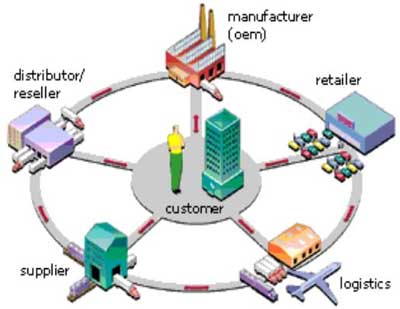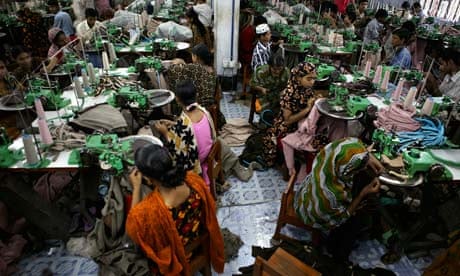Thank you all so very much for your help, I could not have done this without your support!
It has been a while since my last blog update. We were in a homework lock-down for the past few days in order to complete all of the homework we have for the rest of the semester!
I am relieved to not have to think about homework much in these last few weeks before we go, but I wanted to share one of the topics with you that I wrote a paper on. For our Cross Cultural Studies class, I wrote on how Globalization has had an effect on the garment industry and if/how Christians should respond. This is a very important topic for me, as it is a major reason for me returning to school, to further a career in helping fight garment slavery.
I won't write the whole paper out for you, but I wanted to share a few trends with you that I learned and that still break my heart after years of learning about this industry.
Fast Fashion
Today clothes are sold at a phenomenal price! It is easy for someone who does not make a lot of money to buy new clothes. Our society is so obsessed with buying new clothes that we have begun to think of clothes as consumable items, where we buy things, wear them once or twice and then throw them out. The average American will throw out 82 pounds of textile waste a year! They are also so cheap that college students, working parents and even people on a low budget feel that they can afford to buy many clothes often. "A few decades ago there were two clothing seasons a year.. Now it seems there are 52!" - The True Cost
But have you ever stopped to think why clothes aren't increasing in price?
If anything, they've gotten cheaper over the years! The price of the material has gone up, and so have equipment fees and manufacturing costs. Are the stores selling the clothes at a loss in order for the average person to receive a good deal? We know THAT can't be true! So how can they afford it?
Outsourcing

In the 1960's 95% of clothing items sold in North America were made in North America. Today, it's only 3%.
(From The True Cost)
Talk about a huge impact! The smaller our world has become, the easier it is to outsource to countries with the best price. Companies are now able to save money by outsourcing to other countries where labor is cheap, not policed and even often free! Most of our clothes are outsourced to Bangladesh, India or other places in South East Asia which often employ people at a sub-par living wage, or a form of slavery.
Debt Bondage

Many companies and people will say that garment workers are not actually slaves. They are often not chained up, or locked up (although this certainly does happen more often than people think), they often willingly chose to be there and they sometimes even get paid!
So why do we call them slaves?
By asking two questions, you can determine if someone is a slave:
1. Is this person paid nothing beyond subsistence?
2. Can this person walk away, or are they under violent control?
(From Bales, Trodd & Williamson, 2007, p. 30)
Many slaves in the garment industry today are there through "debt bondage". In poor countries, it is a struggle for families to find money to get by on a daily basis. When a crisis arises (famine, sickness, disaster etc.), they have very limited options. Often times a money lender will hear they are having trouble and offer a loan under the promise that they will be able to pay it back through labor.
People usually are aware that they may end up in a slavery situation, but let me ask you this, "Would you rather risk ending up a slave, or watch your children starve to death?". There are usually no better alternatives and people then find themselves in debt bondage.
Don't think they are able to pay back the loans after a few years of slavery either. Many "employers" have no intentions of allowing people leave. They will often charge their "employees" for maintenance to machines, equipment replacement or mistakes to keep them in debt.
If someone dies as a garment worker, their children are usually expected to repay their parents debts, regardless of their age or level of education.
The working conditions of garment workers are also often deplorable. It is dirty, crowded and unsafe. Sometimes the buildings are so rundown that they will cause injury or even collapse, as in the case of the Rana Plaza factory.
Why don't workers complain, or leave?
Usually if people form unions, demand better conditions or try to leave, they are met with violence, are forcefully evicted or raped. In The True Cost there is a story of a woman in Bangladesh who formed a workers union and gave a list of demands for their employers. Later that day the staff locked those involved in a room and beat them ferociously for their rebellion.
How can we help?
I told
myself I wouldn't get too preachy when I started writing this blog, but this
issue really irks me. I feel that much of my future is going to be spent supporting the fight against garment slavery, so I apologize if my passion is a bit much for you. You don't have to read this next part, it may be convicting, it may be a bit pushy, but I feel that it needs to be said, and if you actually want to help, then these are hopefully some tools that will equip you! Please feel free to give me a call or we can get together for coffee if you have differing opinions or want to discuss it further.
I have the following list ordered in what I think is the easiest to the hardest for your average consumer.
1. Ignorance is not Innocence
Learn more about this industry. Don't think that because it doesn't tug at your heartstrings that you are guiltless. Keep informed, think before you buy, and read more!
2. Stop buying so many clothes!
“I don’t want anyone wearing anything that is produced by our blood,” - Shima, a garment worker in Bangladesh who had many friends killed in the Rana Plaza factory collapse.
Do you really need a new outfit for every date night and party? Try different combinations in your own clothes, don't buy so many and try to buy better quality clothes that last!
How do you know if it's really bad?
Is it cheap? If yes, then it's probably really bad. There's a lot of costs involved in making clothes, and labor is most often where the fluctuation is.
Consumers do dictate the way clothing stores conduct business, if enough people stop buying or give enough negative feedback, they will change their practices!
Where was it made? Bangladesh, India, Nepal and China are some red flag areas that are hotbeds for forced labor.
Consumers do dictate the way clothing stores conduct business, if enough people stop buying or give enough negative feedback, they will change their practices!
Where was it made? Bangladesh, India, Nepal and China are some red flag areas that are hotbeds for forced labor.
3. Support Ethical Clothing Brands
There are plenty of clothing brands out there that do not devalue people in other countries.
There are many lists of online shops you can order from, such as this one.
Some you have probably even heard of before are working towards or are fully Fair Trade, such as American Apparel and Patagonia! (I'm currently working on compiling a list of places that I can shop from with a clear conscious)
It is definitely more expensive to buy clothes from these places, but I believe in quality over quantity. One dress made well is going to be the same price as buying 10 from Joe Fresh (one of the worst in the fashion industry) and will likely last the same amount of time.
4. Reduce, Reuse and Recycle!
Be humble! Is your vanity worth the lives of others? Here are some tips about sustainable clothing:
- Shop at Thrift Stores
- Mend your clothes
- Host and attend clothing swaps
- Be hipster! Buck the trend of "Fast Fashion" and get by with less
Not only are these options better for the garment workers and the environment, it is cheaper for you!
5. Write the retailers you normally shop at
Ask them about their ethics. Do they know how much their garment workers make? Most don't even know where the clothes are made or the conditions of their workers because they use "middle men". Slightly better stores will say they support local education and healthcare and have programs in place, but if people are paid a decent wage they can look after that themselves. Tell them you will no longer support them unless they can guarantee their products are made ethically.
5. Write the retailers you normally shop at
Ask them about their ethics. Do they know how much their garment workers make? Most don't even know where the clothes are made or the conditions of their workers because they use "middle men". Slightly better stores will say they support local education and healthcare and have programs in place, but if people are paid a decent wage they can look after that themselves. Tell them you will no longer support them unless they can guarantee their products are made ethically.
Politicians can make a difference in the legislation that exists around slavery, and global support of countries that do not enforce anti-slavery legislation. Inform your MP of the issue involving slavery and ask them to help make a change.
7. Financially support abolitionists
Many organizations are working to free garment slaves throughout the globe. Small things help! If they can afford a car, another telephone or more education they will be more effective in getting people out of "debt bondage" (Again, I am still compiling a list of good organizations and doing my own research).
8. Financially support NPOs and safe Microloans
Poor people and liberated slaves still face the problem of not having enough money to sustain themselves. Many groups goal is to give people a reliable source of income so they can support themselves and have enough money for education, health care and even some savings for emergencies. Supporting groups like Compassion Canada, Ten Thousand Villages and Kiva can make a huge impact.
What does James have to say?
I love the book of James! He was definitely a huge Social Activist, and would certainly have a lot to say to Christians today if he were around! Here are some great verses that totally apply to this issue:
Religion
1:27 Religion that God our Father accepts as pure and faultless is this: to look after orphans and widows in their distress and to keep oneself from being polluted by the world.
- How can we look after orphans if we are causing them to be enslaved in their parents debts?
- The Western world is polluted with Consumerism and Materialism, keep yourself from these!
Discrimination
2:3-5 If
you show special attention to the man wearing fine clothes and say,
“Here’s a good seat for you,” but say to the poor man, “You stand there”
or “Sit on the floor by my feet,” have you not discriminated among yourselves and become judges with evil thoughts? Listen, my dear brothers and sisters: Has not God chosen those who are poor in the eyes of the world to be rich in faith and to inherit the kingdom he promised those who love him?
- Stop turning a blind eye to the poor. They may be on a different continent, but you're wearing the clothes their hands made!
- If discrimination makes us judges with evil thoughts, how much more when we devalue humans and enslave them?
Mercy
2:12-13 Speak and act as those who are going to be judged by the law that gives freedom, because judgment without mercy will be shown to anyone who has not been merciful. Mercy triumphs over judgment.- Have mercy on those who are suffering! If you are not disheartened by this, then pray about it and struggle with it. Ask God how much He wants you to do about it.
Faith, with Action
2:14-17 What good is it, my brothers and sisters, if someone claims to have faith but has no deeds? Can such faith save them? Suppose a brother or a sister is without clothes and daily food. If one of you says to them, “Go in peace; keep warm and well fed,” but does nothing about their physical needs, what good is it? In the same way, faith by itself, if it is not accompanied by action, is dead.
- Do something! Live out your faith!
Desire
4:2-4 You desire but do not have, so you kill. You covet but you cannot get what you want, so you quarrel and fight. You do not have because you do not ask God. When you ask, you do not receive, because you ask with wrong motives, that you may spend what you get on your pleasures. You adulterous people, don’t you know that friendship with the world means enmity against God? Therefore, anyone who chooses to be a friend of the world becomes an enemy of God.
- Ask God what you need, not the world.
- Don't let consumerism and materialism be your motivators.
Judgement
4:11-12 Brothers and sisters, do not slander one another. Anyone who speaks against a brother or sister or judges them speaks against the law and judges it. When you judge the law, you are not keeping it, but sitting in judgment on it. There is only one Lawgiver and Judge, the one who is able to save and destroy. But you—who are you to judge your neighbor?
- This is to remind me, and others who are already concerned with social issues not to let it be our "free pass" for judging others. We need to be a light unto them and expose the darkness, not to cast judgment from our "high horse".
- I apologize if you have felt judgement from me in this blog post. If so, please know it is not my intention. I desire that you will take a step back, think about your spending habits and the full effect they have on people. If you are feeling uncomfortable, I hope that it is conviction and not judgement. If you are convicted, then please look into changing! I would like to help you with that, or at least talk to you about it, if you are ready.
Warning to the Rich
5:1-6 Now listen, you rich people, weep and wail because of the misery that is coming on you. Your wealth has rotted, and moths have eaten your clothes. Your
gold and silver are corroded. Their corrosion will testify against you
and eat your flesh like fire. You have hoarded wealth in the last days. Look! The wages you failed to pay the workers who mowed your fields are crying out against you. The cries of the harvesters have reached the ears of the Lord Almighty. You have lived on earth in luxury and self-indulgence. You have fattened yourselves in the day of slaughter. You have condemned and murdered the innocent one, who was not opposing you.
- Remember that you are the rich. Almost half of the world lives on less than $2.50 a day. Therefore, this warning is for us, the Western world.
Learn More!
If you want to learn more, here are some of the resources I found very informative and interesting, and that I have referenced in this blog post:
A documentary about the fashion industry's impact on garment workers, the environment and Western consumers. It's also available on Netflix!
A book highlighting the causes and types of slavery today, and what we can do to help fix it.
Another book about the modern slave trade.



No comments:
Post a Comment